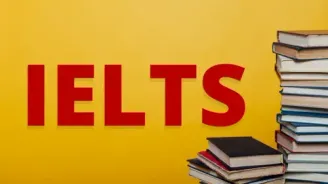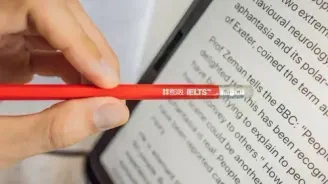What are IELTS Listening Words?
IELTS Listening subjects you to several kinds of accents and types of audio. Did you know that what Brits call a 'biscuit' is what Americans call a 'cookie'? Although the IELTS Exam Focuses on standard English, not regional, building your understanding with vocabulary can play to your advantage!
Whether simple words like cookies or complex words that change meaning in different contexts, it’s important to broaden your vocabulary range to score well in IELTS Listening.
We know there are 4 parts in IELTS Listening (confused about the basics? Start here!). Each part has a different purpose. For example, part 1 of IELTS Listening focuses on everyday conversations, so you may encounter simpler words and phrases.
Parts 2 and 3 may explore more complex academic issues. Brace yourself for some sophisticated word choices.
The IELTS Listening test focuses on identifying specific details, such as missing words, filling out application forms, and completing a map. Missing key vocabulary can lead to confusion and, eventually, the wrong answer.
Therefore, strengthening your knowledge of IELTS Listening words is essential for an all-rounded prep! Your vocabulary range will have increased 10x by the end of this page.
We’ve split this page part-wise, making it easier for you to learn more relevant vocabulary. Write to learn at least 10 words from the list daily, and return for more.
IELTS Listening Words for Parts 1 & 2
Parts 1 and 2 of IELTS Listening feature everyday conversations; therefore, the range of vocabulary is simpler and revolves around topics like making travel arrangements or talking about local facilities.
Learn these common words used in IELTS listening!
Words
Word | Definition | Example Sentence |
| Appointment | A scheduled meeting | I have an appointment with the dentist at 3 PM. |
| Budget | An estimate of income and expenditure | We need to stick to our budget this month. |
| Commute | Travel to and from work | My daily commute takes about 45 minutes. |
| Deadline | The latest time or date by which something should be completed | The project deadline is next Friday. |
| Discount | A reduction in price | The store is offering a 20% discount on all items. |
| Enquiry | A question | I made an enquiry about the available courses. |
| Feedback | Information about reactions to a product or a person's performance | The teacher gave me feedback on my essay. |
| Lecture | An educational talk to an audience | The professor’s lecture on history was fascinating. |
| Reservation | An arrangement to secure accommodations | I made a reservation at the restaurant for 7 PM. |
| Schedule | A plan of activities or events | I need to check my schedule before confirming. |
| Admission | Permission to enter | The museum's admission fee is $10. |
| Annual | Occurring once every year | The annual festival attracts thousands of visitors. |
| Community | A group of people living in the same area or having common interests | The community center offers various activities for all ages. |
| Development | The process of growth or progress | The new housing development will include parks and shops. |
| Exhibition | A public display of works of art or other items of interest | The science exhibition was very informative. |
| Facilities | Places, amenities, or pieces of equipment provided for a particular purpose | The gym has excellent facilities. |
| Initiative | A new plan or action to improve something or solve a problem | The recycling initiative has been very successful. |
| Lecture | An educational talk to an audience | The guest lecture on climate change was enlightening. |
| Membership | The state of being a member of a group | The gym membership costs $50 per month. |
| Resources | A stock or supply of money, materials, staff, and other assets | The library provides various learning resources. |
Phrasal Verbs
Phrasal Verb | Definition | Example Sentence |
| Sign up | To register for something | I decided to sign up for the cooking class. |
| Call off | To cancel | We had to call off the meeting due to bad weather. |
| Fill out | To complete a form | Please fill out this application form. |
| Find out | To discover | I need to find out the train schedule. |
| Get along | To have a friendly relationship | I get along well with my coworkers. |
| Look forward to | To anticipate with pleasure | I look forward to our vacation next month. |
| Pick up | To collect | Can you pick up the kids from school? |
| Run out of | To have no more left | We ran out of milk, so I need to buy some. |
| Turn up | To arrive or appear | She didn’t turn up for the meeting. |
| Work out | To exercise or to find a solution | I like to work out at the gym in the morning. |
| Carry out | To perform or conduct | The researchers carried out an extensive study. |
| Come across | To find by chance | I came across an interesting article yesterday. |
| Drop off | To deliver someone or something | I will drop off the package at the post office. |
| Figure out | To understand or solve | She finally figured out the solution to the problem. |
| Look into | To investigate | We need to look into the issue further. |
| Put off | To delay | They decided to put off the meeting until next week. |
Idioms
Idiom | Definition | Example Sentence |
| A piece of cake | Something very easy | The exam was a piece of cake. |
| Break the ice | To initiate conversation in a social setting | He told a joke to break the ice at the party. |
| Hit the books | To study hard | I need to hit the books to prepare for the exam. |
| In the same boat | In the same situation | We’re all in the same boat with these deadlines. |
| Once in a blue moon | Very rarely | He visits his hometown once in a blue moon. |
| Over the moon | Extremely happy | She was over the moon when she got the job. |
| Pull someone's leg | To joke or tease someone | Are you pulling my leg, or is this serious? |
| Take it easy | To relax | You should take it easy this weekend. |
| Under the weather | Feeling ill | I’m feeling a bit under the weather today. |
| Up in the air | Uncertain | Our plans for the weekend are still up in the air. |
| A blessing in disguise | Something that seems bad at first but results in something good | Losing that job was a blessing in disguise. |
| Cost an arm and a leg | Very expensive | The new car cost an arm and a leg. |
| Cut corners | To do something poorly in order to save time or money | They cut corners to finish the project on time. |
| In the long run | Over a long period of time | Investing in education will pay off in the long run. |
| On the ball | Alert and efficient | The new manager is really on the ball. |
| Pull out all the stops | To make every effort | We need to pull out all the stops to meet the deadline. |
| Sit on the fence | To remain neutral or undecided | He tends to sit on the fence during political debates. |
| The best of both worlds | All the advantages | Working from home offers the best of both worlds. |
| Time flies | Time passes quickly | Time flies when you’re having fun. |
| Up to scratch | Meeting the required standard | His work is not up to scratch this week. |
IELTS Listening Words for Part 2 & 3
Parts 2 and 3 feature slightly academic audio, such as a group discussion or a monologue lecture. Below are some common words used in IELTS Listening audio!
Words
Word | Definition | Example Sentence |
| Analysis | Detailed examination of elements or structure | The analysis of the data took several weeks. |
| Approach | A way of dealing with a situation or problem | We need a new approach to solve this issue. |
| Argument | A reason or set of reasons given in support of an idea | Her argument was well-structured and convincing. |
| Assessment | The evaluation of the nature, quality, or ability of someone or something | The assessment will include a written test and an interview. |
| Concept | An abstract idea or general notion | The concept of democracy is central to their society. |
| Context | The circumstances that form the setting for an event, statement, or idea | Understanding the context is crucial for interpretation. |
| Hypothesis | A proposed explanation made based on limited evidence | The hypothesis needs to be tested through experiments. |
| Methodology | A system of methods used in a particular area of study | The research methodology is outlined in Chapter 3. |
| Perspective | A particular attitude toward or way of regarding something | The book offers a new perspective on the war. |
| Theory | A supposition or a system of ideas intended to explain something | The theory of evolution is widely accepted. |
| Variable | An element, feature, or factor that is liable to vary or change | The experiment measured several variables. |
| Evidence | The available body of facts or information indicating whether a belief is true | The evidence supports the scientist's claims. |
| Framework | A basic structure underlying a system, concept, or text | The theoretical framework is explained in the introduction. |
| Principle | A fundamental truth or proposition that serves as the foundation for a system of belief | The principles of physics apply to all matter. |
| Interpretation | The action of explaining the meaning of something | Her interpretation of the poem was unique. |
| Outcome | The result of an action or event | The outcome of the study was unexpected. |
| Parameter | A numerical or other measurable factor | The parameters of the study were strictly defined. |
| Paradigm | A typical example or pattern of something | This case study provides a paradigm of successful innovation. |
| Synthesis | The combination of ideas to form a theory or system | The essay requires the synthesis of multiple sources. |
| Validity | The quality of being logically or factually sound | The validity of the results is in question. |
| Abstract | A summary of the contents of a book, article, or formal speech | The abstract of the paper outlines the main arguments. |
| Citation | A quotation from or reference to a book, paper, or author | Make sure to include proper citations in your essay. |
| Correlation | A mutual relationship or connection between two or more things | The study found a correlation between diet and health. |
| Dissertation | A long essay on a particular subject | Her dissertation focuses on environmental policy. |
| Empirical | Based on observation or experience rather than theory | The research includes both theoretical and empirical analysis. |
| Hypothetical | Based on or serving as a hypothesis | The scenario is purely hypothetical and not based on real events. |
| Implication | The conclusion that can be drawn from something, although it is not explicitly stated | The implications of the findings are significant for future research. |
| Paradigm shift | A fundamental change in approach or underlying assumptions | The invention of the internet caused a paradigm shift in communication. |
| Qualitative | Relating to, measuring, or measured by the quality of something rather than its quantity | The study used qualitative methods to gather data. |
| Quantitative | Relating to, measuring, or measured by the quantity of something rather than its quality | Quantitative data is essential for statistical analysis. |
| Reliability | The quality of being trustworthy or performing consistently well | The reliability of the results was questioned. |
| Significance | The quality of being worthy of attention | The significance of the study lies in its innovative approach. |
| Synthesize | Combine into a coherent whole | The goal is to synthesize information from various sources. |
| Thesis | A statement or theory put forward to be maintained or proved | His thesis was well-argued and supported by evidence. |
| Variable | An element, feature, or factor that is liable to vary or change | The experiment measured several variables. |
| Peer review | Evaluation of scientific, academic, or professional work by others working in the same field | The paper is currently under peer review. |
| Longitudinal | Over a long period of time | The study is a longitudinal analysis of patient outcomes. |
| Methodological | Relating to the system of methods used in a particular area of study or activity | The methodological approach was comprehensive. |
| Paradigm | A typical example or pattern of something | This case study provides a paradigm of successful innovation. |
| Validity | The quality of being logically or factually sound | The validity of the results is in question. |
Phrasal Verbs
Phrasal Verb | Definition | Example Sentence |
| Break down | To separate into simpler substances or parts | The professor broke down the complex theory into manageable parts. |
| Carry out | To conduct or perform | The scientists carried out a series of experiments. |
| Come up with | To think of an idea or plan | She came up with a brilliant solution to the problem. |
| Look into | To investigate or examine | The committee will look into the issue further. |
| Point out | To direct attention to | He pointed out the flaws in their argument. |
| Put forward | To propose or suggest | The researcher put forward a new hypothesis. |
| Set up | To establish or arrange | They set up the equipment before starting the experiment. |
| Take into account | To consider | The study takes into account various factors. |
| Turn out | To result in a particular way | The experiment turned out to be a success. |
| Work out | To find a solution | We need to work out the details of the project. |
| Account for | To explain the reason for something | Can you account for the discrepancy in the data? |
| Break down | To separate into parts for analysis | The professor broke down the complex theory into simpler terms. |
| Build on | To use a success or achievement as a base | We can build on the previous research. |
| Come up with | To think of an idea or plan | She came up with a brilliant solution to the problem. |
| Draw on | To use information or experience | The author draws on extensive research to support his arguments. |
| Figure out | To understand or solve something | The team is trying to figure out a new strategy. |
| Look into | To investigate or examine | We need to look into the reasons for the failure. |
| Point out | To direct attention to | He pointed out the flaws in their argument. |
| Set out | To start an activity with a specific goal | The researchers set out to prove their hypothesis. |
| Take into account | To consider | The study takes into account various factors. |
Idioms
Idiom | Definition | Example Sentence |
| At the drop of a hat | Without any hesitation | She can solve math problems at the drop of a hat. |
| Back to the drawing board | Start over | The experiment failed, so it's back to the drawing board. |
| Best of both worlds | All the advantages | Studying abroad gives her the best of both worlds. |
| Cut to the chase | Get to the point | Let's cut to the chase and discuss the main findings. |
| In the same boat | In the same situation | All the students are in the same boat during finals week. |
| Out of the blue | Unexpectedly | The results came out of the blue and surprised everyone. |
| See eye to eye | Agree | The researchers did not see eye to eye on the methodology. |
| The ball is in your court | It's your decision | I've explained the plan; now the ball is in your court. |
| The elephant in the room | An obvious problem not being addressed | The lack of funding is the elephant in the room. |
| Up in the air | Uncertain | The project's future is still up in the air. |
| By and large | Generally | By and large, the students performed well on the test. |
| Call it a day | Stop working on something | Let's call it a day and resume tomorrow. |
| Change of heart | A change in one's opinion or feelings | She had a change of heart and decided to stay. |
| Cutting-edge | Extremely advanced or innovative | The company is known for its cutting-edge technology. |
| In the loop | Informed and involved | Please keep me in the loop about the project. |
| Make ends meet | To have enough money to cover expenses | It's hard to make ends meet on such a low salary. |
| On the same page | In agreement | The team is finally on the same page about the plan. |
| Out of the question | Not possible or allowed | Travelling abroad this year is out of the question. |
| The tip of the iceberg | A small, visible part of a larger problem | The issues we see are just the tip of the iceberg. |
| Throw in the towel | To give up or quit | After several failed attempts, he decided to throw in the towel. |
Tips to Learn IELTS Listening Words
Did you learn new words? The only way to remember them for a long time, is to effectively use it in conversation.
Here’s what else you can do to improve your IELTS Vocabulary range!
1. Read Regularly
Reading is so much fun if you’re hunting for new words. Try reading a variety of English texts, such as newspapers, academic journals, novels, and online articles. Reading exposes you to new words in different contexts, helping you understand their meanings and usage.
You could start by reading ‘The Guardian’ for news, ‘Nature’ for scientific articles, and ‘BBC Learning English’ for language tips.
2. Listen to English Media
Regularly listen to English podcasts and watch English-language TV shows and movies. This will help you get accustomed to different accents and pronunciations while learning new vocabulary. Plus point: It’s also fun and entertaining!
If you don’t know where to start, begin with ‘TED Talks Daily’ and ‘BBC World Service.’ The best thing about listening is you can do it while commuting or even brushing your teeth! No extra commitment is required.
3. Create a Vocabulary Journal
Maintain a journal to record new words, their meanings, and example sentences. Review and update this journal regularly to reinforce your learning. If you want to make it fun, give yourself daily challenges.
Example: Start by learning 10 new words every week, and once you’ve completed this challenge, you can start collecting 20 words a day.
4. Practice with IELTS Materials
Use official IELTS Listening practice materials and sample tests. These resources often include words commonly used in the Listening section and provide a realistic context for vocabulary usage.
We’ve covered tons of IELTS Listening practice topics. Have you had a look? Start here.
5. Engage in Conversations
Practice speaking with native or fluent English speakers. Engaging in conversations helps you learn new words naturally and understand their usage in context.
You can also join a club or community where people are learning English.
6. Use Context Clues
When encountering an unfamiliar word, try to infer its meaning from the context rather than immediately looking it up. This skill is particularly useful during the IELTS Listening test.
For example, you hear the sentence, "The experiment’s outcome was unexpected." Now, you have no clue about the word "outcome," but if you think about it, you can deduce its meaning from the context, understanding it to mean "result."
7. Learn Word Families
Study words related to each other (nouns, verbs, adjectives, adverbs) together. Understanding word families helps you recognise different forms of a word during the listening test.
8. Practice Dictation words for IELTS Listening
Regularly practice dictation using passages specifically designed for IELTS Listening. This exercise will not only improve your listening skills but also reinforce your vocabulary, helping you become more familiar with the words and phrases commonly used in the test.
You could start by listening to IELTS listening practice materials or find passages that are similar in style and content. Listen to a short segment, pause, and write down exactly what you hear. Compare your transcription with the original text to identify mistakes and new vocabulary.








